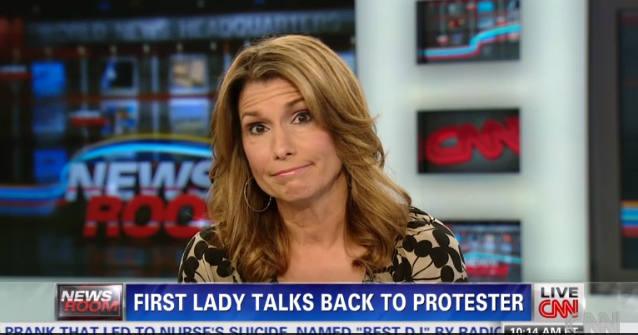"Some people might say, though, that the gay rights movement has come such a long way. It wants everything all at once, and it just doesn't happen that way!"
--Carol Costello, CNN

I didn't give the FLOTUS heckling much thought until I ran across CNN Newsroom anchor Carol Costello's condescending interview with CNN analyst LZ Granderson. In the video, Costello mentions Obama's rising popularity, but, as Costello dismissively puts it, she's still subject to hecklers. In this introduction, we've a clear sense of how Costello will approach these "hecklers" throughout the rest of the interview, as if they are nothing more than nuisances who don't know their place.
Costello makes a dismissive grimace when she reports the cause of the heckler, Ellen Sturtz: The LGBT community is not protected from workplace discrimination.
Both of these moments seemed strange coming from an anchor on a series called Newroom, but Costello's condescending views on the heckling are crystalized later in the interview: "Some people might say, though, that the gay rights movement has come such a long way. It wants everything all at once, and it just doesn't happen that way!"
Let's be clear. Costello is among those "some people." Let's also be clear that Costello's remark is shameful and embarrassing: She suggests that equal rights groups should be happy with the glacial march toward progress and equality (a trajectory that, if you will notice, is mostly related to marriage equality). "It wants everything all at once, and it just doesn't happen that way!"
Yes, Carol Costello. The LGBTQ community wants equality all at once. You can bet we will demand it. And to suggest that we should be satisfied with the successes we've had (namely the march toward marriage equality, which isn't a high priority for many LGBTQ activists) in the past few years as adequate and that we should essentially stop rocking the boat is to suggest that the fight for equality has a timeline. And not only a timeline but a proper venue for that timeline.
I've seen many comments saying things like:
"Yes, well, it was just disrespectful..."
"It was in a room with children..."
"The First Lady doesn't set policy..."
"It wasn't fair..."
"It was the wrong time and place..."
These arguments are confusing to me, because where is the time and place to make demands of our leaders? Where do civil rights happen?
But these weren't just outbursts. They weren't just hecklings. Sturtz was not making demands of Michelle Obama; she was making demands of an American public -- the same public that Michelle Obama in part represents as an American symbol. The FLOTUS is a political being and constantly inserts herself into politics. Heckling her at a public event is not an individualized attack any more than throwing a pie in Anita Bryant's face was in 1977. It's not about the people themselves but what (or whom) they represent.
The "gay lobbies," as they have been affectionately called, do not in fact represent the voices or concerns of all members of the LGBTQ communities, many of whom have different priorities than marriage equality. These include attention to issues like poverty (queer youth homelessness), social services (denied coverage to transgender people), institutional negligence (prison rape), workplace inequality, etc.
When the rhetoric of "gay equality" is tied uniquely to "marriage equality," we have people like Carol Costello reporting its successes and figuring "gay equality" is a Supreme Court decision away from coming to fruition. But, again, gay equality and gay advocacy groups do not always have the needs and concerns of the other LBT and Q folks prioritized.
And so I ask again: Where do civil rights happen? Should the folks at the Stonewall Inn have waited for their day in court to argue for rights? LGBTQ activists have a long history of these so-called inappropriate disruptions, because we also have a long history of silencing. Before a mainstream "gay lobby machine" became a permanent fixture in Washington, D.C., gay rights activists had to disrupt the status quo in order to overcome that silencing. How else were they supposed to draw attention with a media moratorium on their issues? These were often called "zaps," public demonstrations designed to confront or embarrass a public figure while calling attention to human rights.
These zaps and other inconvenient "out of time and place" protests are precisely the reason something like marriage equality is now so close to passing, because they brought into the public consciousness a previously ignored or silenced conversation. We cannot and should not presume that equal rights will be fought and won by following a tried-and-true and convenient timeline, because that has never happened.
To be sure, our current fight toward marriage equality is built upon the backs of these zaps, on the crust of Anita Bryant's "fruit" pie, and on the receiving end of the shouts by a powerful public figure into the face of a woman demanding equality before she dies. No one should take for granted inconvenient activism and all it has made possible, least of all the gay community and the Obamas.
So, yes, Carol Costello, we want it all at once.